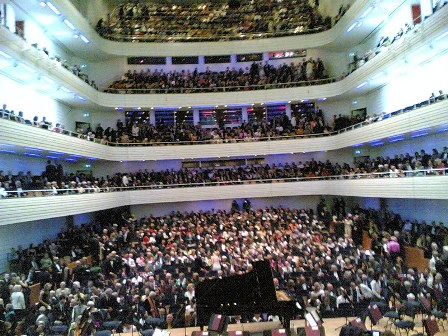|
THE WANDERER'S CHRONICLE
|
The programme of the first concert included Beethoven’s 3rd piano concerto with Alfred Brendel as soloist. I was still under the spell of Martha Argerich’s interpretation in Ferrara with the Mahler Chamber Orchestra. There Abbado had followed Argerich’s lead and an interpretation full of genius had been the result. With Brendel on the other hand it was obvious that a different approach was necessary. Here a larger orchestra was inevitable, with a more decisive rhythm, a vision in some ways more traditional, but no less fascinating, with its ruptures, its majestic colours, its more “Austrian” aspects, more appropriate perhaps to the Bruckner that followed. It was, as always with Brendel, very personal and, as often happens, with slight mistakes here and there but which were easily forgiven – all the more so as the interpretation is monumental. Of the three performances heard (two concerts and the dress rehearsal) the second concert was perhaps the most convincing technically with a more conclusive dialogue between conductor and soloist. An example: the beginning of the third movement and the almost complete lack of silence between the second and third movement seemed to have surprised even Abbado. Here Brendel (in the second concert) allowed for an extra moment of silence. Brendel offers us a more traditional vision, a more intellectual one, which does not resemble Abbado’s Beethoven of recent years – slimmer, more vigorous, more vital. But why should one not just sit back and enjoy yet another different approach. To be able to vary your style according to your partner is a proof of uncommon wealth: one had the impression that at one point Brendel dominated, at another Abbado. It was a duet in which the voices took it in turns to takes over the reins. Bruckner’s 7th symphony could not but bring back to us sad memories: the last time we heard it was in this same hall at the end of August 2001 played by the Berlin Philharmonic and conducted by Bernhard Haitink, substituting for Claudio Abbado, so very critically ill at the time. Numerous are those who have their difficulties with Bruckner: monumental scores lacking the refinement of Mahler, abuse of brass, exaggerated repetitions of motives, apparent incapacity to come to an end. Those are often heard reasons. The 7th symphony (like the 4th) remains the best known and most popular one: it was Bruckner’s first triumph (in Leipzig on 30.12.1884, conducted by Arthur Nikisch, his admirer from the very beginning). We also remember Visconti’s use of it in his film “Senso”. To perform it in Lucerne, so close to Tribschen where Wagner spent vital years, is to call to mind the bond between Bruckner and Wagner as well as the deep admiration this composer felt for the master of Bayreuth. Dahlhaus used to say that if Wagner maintained that it was Beethoven he leant upon to build a musical drama, then Bruckner as for him used the language of musical drama to write his symphonies. Beethoven, Wagner, Bruckner: we resolutely follow this red thread through 19th century music whilst listening to this symphony which is clearly a tribute to Wagner. The adagio in particular (written shortly after Wagner’s death in Venice in 1883) resembles a funeral and melancolic escort. It uses Wagnerian resources (first bars) without falling into imitation or servility (including all the same some Wagnerian quotations often found in music of the end of the 19th century). With his peerless orchestra (about which everything has been said) Abbado offers us a reading as ever precise. He allows all the texture of the composition to surface, all the various levels of instrumentation, which accentuates each instrumentalist: Reinhold Friedrich’s trumpet, Raymond Curf’s timpani, the woodwinds of Sabine Meyer, Albrecht Mayer, Jacques Zoon. What is so astonishing, despite being used to such irreproachable performances, is the plenitude and the coherence of the sound, the bloom so sensitive of the strings (I have a soft spot for the celli). In this context of perfection the greatest moments are still the famous beginning of the first movement as well as its final crescendo - a climax interrupted brutally, as if in suspension – and the adagio with its incredible interplay of the strings and the wood section. Bruckner knows how to play with a tune, interrupting it a little further on so as to create a sense of frustration in the listener, but also a feeling of tension. The audience lives this tension right up to the explosion. Explosion – an expression which, I am sure, has rarely been used in connection with so much softness, so much contemplation, such lyricism at the same time passionate and smooth. This is not just any orchestra. Leaving out of consideration the fact that most are exceptional soloists they also nearly all know one another. They have worked together elsewhere and have known Abbado for two, ten or twenty years. The master called and they all came as a German journalist wrote. The special atmosphere can be felt in particular at the end of a concert when all embrace and through the smiles of complicity they exchange during the performance. What holds them all together is Claudio Abbado who creates a sense of adherence which is not mystic but affectionate. Music seems to leak out of his whole body, he emanates warmth, feeling, enthusiam and this genuine vibration which he can communicate so well to his musicians. You just have to look into his face - alternatively fierce, smiling, meditative or ecstatic – to understand that what is happening is vital: nothing common, nothing we have seen before, but on the contrary some new horizons – which brings us to the motto of this year’s festival – “Neuland” (new ground).
|
|
